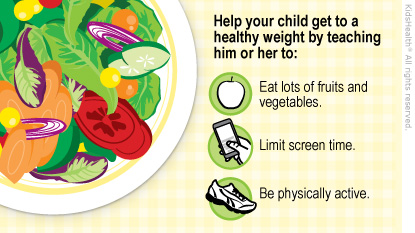Healthy Weight: How to Help Your Child
Children come in different shapes and sizes, but sometimes kids gain weight too fast. Being very overweight can lead to serious health problems. To help your child lose weight, make healthy eating and physical activity a regular part of your family's routine.


Build healthy habits:
-
Prepare meals at home when possible. Limit trips to restaurants and fast-food places.
-
Set regular meal and snack times
-
Eat together as often as you can.
-
Don't force kids to eat. Teach them to listen to their body about when they're hungry and when they're full.
-
Don't use food as a reward or punishment.
-
Have everyone in the family eat all meals and snacks at the table, not while walking around or watching TV or other screens, including computers, tablets, and phones.
-
Make family rules about screen time. Don't let screen time get in the way of being active, getting enough sleep, and connecting with family and friends.
-
Help your child be active every day.
-
Kids who get enough sleep are less likely to be overweight. Help your child get enough sleep. Sleep needs vary from child to child, but on average:
-
Kids 2–3 years old need 11–14 hours of sleep (including naps).
-
Kids 3–5 years old need 10–13 hours of sleep.
-
Kids 6–12 years old need 9–12 hours of sleep a night.
-
Teens need 8–10 hours of sleep a night.
-
Set a good example for your kids. Choose healthy foods, exercise regularly, limit your screen use, and get enough sleep.
-
Follow your health care provider's recommendations about:
Help your child get the best nutrition:
-
Offer nutritious meals and snacks. Follow your health care provider's advice on the right portion sizes for your child.
-
Make sure your child gets enough calcium (skim milk and low-fat yogurt are good sources) and iron (beef, chicken, and tofu are good sources).
-
Include a fruit and/or vegetable in every meal and snack. For young kids, avoid hard, raw fruits and vegetables because they can cause choking.
-
Don't give your child soda, sugary drinks, or juice.
-
Avoid keeping foods that are high in fat and sugar in the house. These include cookies, chips, and cake. Make these "once in a while" foods.

Your child:
-
is thirstier, drinks more, and is peeing more often than usual
-
has hip and knee pain
-
starts snoring
-
has headaches or vision changes
-
is a girl whose periods do not come regularly
-
seems sad or not interested in doing things they used to enjoy
-
has behavior problems at home or at school

Why is weight a problem for kids? Kids who are overweight or obese can develop health problems like diabetes, high blood pressure, high cholesterol, bone and joint trouble, liver disease, sleep problems, and problems with menstrual periods.
Kids who are overweight or obese are also more likely to struggle with unhealthy dieting habits, depression, and poor self-esteem.
Why are follow-up visits so important? Health care providers schedule follow-up visits to monitor your child's health. They may check for high blood pressure, diabetes, high cholesterol, liver problems, and other health issues.
At follow-up visits, your health care provider will also help you and your child set healthy lifestyle goals. Changing eating and exercise habits takes time, and your provider can support you and your child along the way.